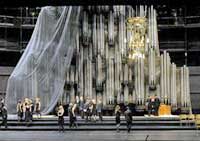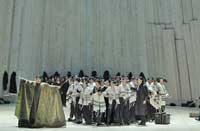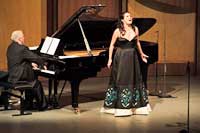|

View
Select Articles
NEW: View FlipBook |
 The Salzburg Festival: A Magical Musical Extravaganza The Salzburg Festival: A Magical Musical Extravaganza
By Irving Spitz
|
Christine Schäfer (Theodora)
© Monika Rittershaus, Berlin
|
 |
Staging of Theodora
© Monika Rittershaus, Berlin |
 |
Nicola Alaimo (Pharaon), Ildar Abdrazakov (Moïse), Concert Association of the Vienna State Opera Chorus
© Clärchen Baus-Mattar & Matthias Baus, Köln-Dellbrück |
 |
Daniel Barenboim and Anna Netrebko in their joint recital
© Wolfgang Lienbacher, Salzburg
|
The five week Salzburg summer Festival has just run its course. This flashy elitist show case of European culture attracts a wide and sophisticated audience. In contrast to previous years, there were scattered empty seats at several events, no doubt a consequence of the international economic downside. The festival featured four new staged operatic productions, two operatic revivals in addition to the usual run of theatrical performances, orchestral concerts, lieder and soloist recitals. Some 250,000 people from 68 nations attended a total of 240 performances.
To commemorate the 250th anniversary of Handel's death, there was a staged production of Theodora. This seemed an odd choice since this work was composed as an oratorio. Theodora, a Christian convert, was imprisoned and sentenced to forced prostitution for refusing to worship Roman gods. The Roman soldier Didymus, a recent Christian convert is in love with Theodora and frees her from her imprisonment. Both are sentenced to death by the Roman commander Valens despite protestations of his officer Septimius. Theodora and Didymus willingly go to their death, strengthened by their strong belief. The German director Christof Loy and set designer Annette Kurz mounted huge organ pipes as the dominant backdrop to the production. In a clever innovation, British organist, James McVinnie used this instrument to perform one of Handel’s organ works which was incorporated into Act 3. The protagonists were dressed in contemporary black suits by German costume designer, Ursula Renzenbrink. The chaste Theodora was clothed in pure white but after her imprisonment she appeared in red. German soprano, Christine Schäfer took on the demanding role of Theodora which she carried out with sensitivity and vocal elegance. She was ably supported by American countertenor Bejun Mehta as the Roman soldier Didymus and German baritone Johannes Martin Kränzle as the Roman commander Valens. Canadian Joseph Kaiser sung the role of Septimus to great effect British conductor Ivor Bolton led a forceful and dramatic rendering of the score with exemplary playing by the Freiburg Baroque Orchestra and the Salzburg Bach Choir.
Another new operatic production was Rossini’s Moise et Pharaon. This French version of the opera was premiered in Paris and represents a reworking of an earlier version, Mose in Egitto. In its day, this French version was a great success and had mass appeal. No small wonder, since it is filled with action and beautiful music. There is also a love story thrown in. Dramatic events included the plagues inflicted on the Egyptians, the exodus of the Jews from Egyptian slavery culminating in their successful crossing of the Red Sea with the drowning of the Egyptian army. Talk about action! There were also more subdued moments such as a love affair between Amenophis, son of Pharaoh and Anai, niece of Moses. Salzburg Festival Director Jürgen Flimm and the Austrian stage director, Ferdinand Wogerbauer wisely opted not to visually depict the plagues. Instead, they projected a written biblical account from the book of Genesis. This was done during what should have been the ballet interlude. The staging was dominated by an enormous wooden cylindrical structure. For the more intimate moments devoid of crowd scenes, a clever sliding system eliminated the backdrop and left the singers in small squares and rectangles ensuring that they would not be dwarfed by the gigantic stage of the Grosses Festspielhaus. Austrian costume designer, Birgit Hutter, clothed the Jewish slaves in modern dress together with their religious symbols. The penultimate scene reveals the Jews waiting to cross the Red Sea with shabby suitcases. This was all too reminiscent of recent historical events when the Jews waited to be transported to Nazi death camps. The vocal cast was strong. Very impressive was Russian bass-baritone Ildar Abdrazakov who took the role of Moses. Italian baritone Nicola Alaimo as Pharaoh also made a strong impact. His son Amenophis was portrayed by the American Eric Cutler. His ardent tenor voice was effective in the tender scenes with Anai when he tried to persuade her to forgo her heritage and marry him. When rejected by Anai, he displayed both dramatically and vocally the vengeance of a jilted lover. Anai, herself was sung effectively by Latvian soprano Marina Rebeka whose Act 4 aria when she finally rejected Amenophis and returned to her people, brought the house down. The Georgian mezzo, Nino Surguladze, as Pharaoh’s wife and Moses’ sister, Italian mezzo Barbara Di Castri's, were fully up to their challenging roles. The greatest accolades were reserved for conductor Riccardo Muti who led a thoughtful, incisive and impeccable performance from the Vienna Philharmonic Orchestra and its stellar chorus.
This year also represents the tenth anniversary of Daniel Barenboim’s West-Eastern Divan Orchestra which is comprised of young musicians from Israel, the neighboring Arab States and Spain. This venture is Barenboim’s attempt to bridge the political and cultural divide between Israel and its Moslem neighbors through music. The main offering was a concert version of Beethoven’s Fidelio. Barenboim replaced the usual long winded spoken dialog with a new narrative which outlined the imprisonment and subsequent release of Florestan but also reflected on what the uncertain future might bring. German soprano, Waltraud Meier undertook the title role and also served as the narrator.
This double role proved to be over taxing. The most elegant and vocally pleasing voices in this performance were those of British bass, John Tomlinson as the jailer, Rocco, and Norwegian baritone, Terje Stensvold, who took over the challenging role of the evil prison governor, Pizarro, at short notice. The major reason for the success of this concert version of Fidelio was the enthusiasm of the young orchestra members who gave a highly creditable performance.
Daniel Barenboim was also active as a pianist and accompanied the Russian soprano, Anna Netrebko, a long time Salzburg and indeed international favorite. Their program consisted of Russian songs by Rimsky Korsakoff and Tchaikovsky. This was another outstanding event. Netrebko’s charisma showed through. Depending on the nature of the song, this consummate artist displayed the appropriate emotion whether it be love, dejection, sadness, melancholy, anger, exhaustion, happiness or delight. This could be heard, seen and felt by the enthralled audience.
Spending six days in Salzburg sampling these musical delicacies represents a unique and unforgettable experience. It certainly recharged the batteries. Now back to the real world…
Irving Spitz, emeritus professor of medicine, is an avid traveler and photographer. He frequently writes, reviews and lectures on medical topics, music, art, history and travel. Some of his photographic images can be seen on http://www.pbase.com/irvspitz
|
|
